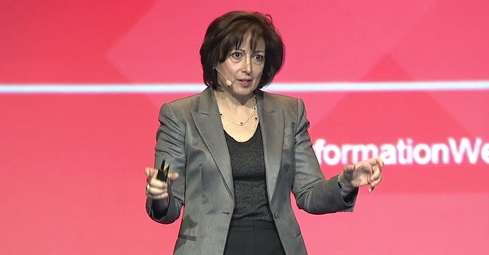Biogen's Andi Karaboutis believes medicine is about to get much more personal.


20 Great Ideas To Steal In 2015
20 Great Ideas To Steal In 2015 (Click image for larger view and slideshow.)
Automobiles and computers may be complicated machines, but they pale in comparison to the human body. The challenge of working in an industry committed to that complexity brought Adriana (Andi) Karaboutis from Dell, where she served as CIO, to join Biogen as executive VP of technology.
Speaking at the InformationWeek Conference at Interop in late April, Karaboutis argued that the age of biotechnology has arrived.
"Biotech has progressed to the point where we're actually able to edit or code DNA …," said Karaboutis, characterizing the intersection of biology, information technology, and data as massive opportunity.
In the past five years, the FDA has approved an unprecedented number of drugs, 44 in the last year alone. "Steve Jobs was quoted as saying the biggest breakthroughs of the 21st century are going to happen at the crossroads of biology and technology," said Karaboutis, adding that she sees these breakthroughs happening in the progress being made to provide treatments for so-called orphan diseases and in the approval of new drugs.
The combination of computing power and health research will lead to the "Internet of Me," Karaboutis said, in which treatments become more effective through personalization.
As an example of the benefits of personalization, she recounted her own struggle with hyperthyroidism, or Grave's disease, over a decade ago. The treatment prescribed by two different doctors, iodine ablation, left her feeling ill. Eventually, a doctor at the Mayo Clinic recognized that she was receiving too much iodine.
"She said we've done some more stratifications to this normal range, and for your height and weight, you're just taking a little too much," Karaboutis recalled. "… Within three weeks I was back to normal, because my normal range was a very different tail of the bell curve."
Everyone is going to expect this level of personalization: "I don't want to be treated based on what the averages are, because I happen to be very unique," said Karaboutis.
Technology Must Connect In New Ways
Connected technology in the context of healthcare provides the opportunity to gather the data necessary to create such personalized treatments. "It's about the Internet of Me," Karaboutis said, citing partnerships with Google and FitBit designed to help multiple sclerosis patients. "That's where we're going with this industry [in terms of technology]."
At Biogen, traditional enterprise IT functions continue to be important, said Karaboutis, but the mandate for the technology organization extends to enabling the scientific and computational work that improves people's lives.
"Healthcare is changing," said Karaboutis. "It's no longer about treating symptoms. It's about outcomes."

(Image: InformationWeek/Biogen)
Supporting that goal as a technology organization isn't necessarily straightforward. Karaboutis says the IT group has to understand the study of science and the cultural differences between technology and science. "I come from a world where you reduce the alternatives, you make a decision, and you go," said Karaboutis, referring to her time in the automotive and computer industries. "Scientists don't like to reduce their alternatives."
Technology may enable innovation, but as Karaboutis sees it, it's not calling the shots.
"Technology is not the long pole in the tent in this industry," she said. "It is making sure that our regulatory, our privacy, our practices, and our culture are right there together. From a technology perspective, we've got a lot we can use. It's how much can be put into practice."
About the Author(s)
You May Also Like







